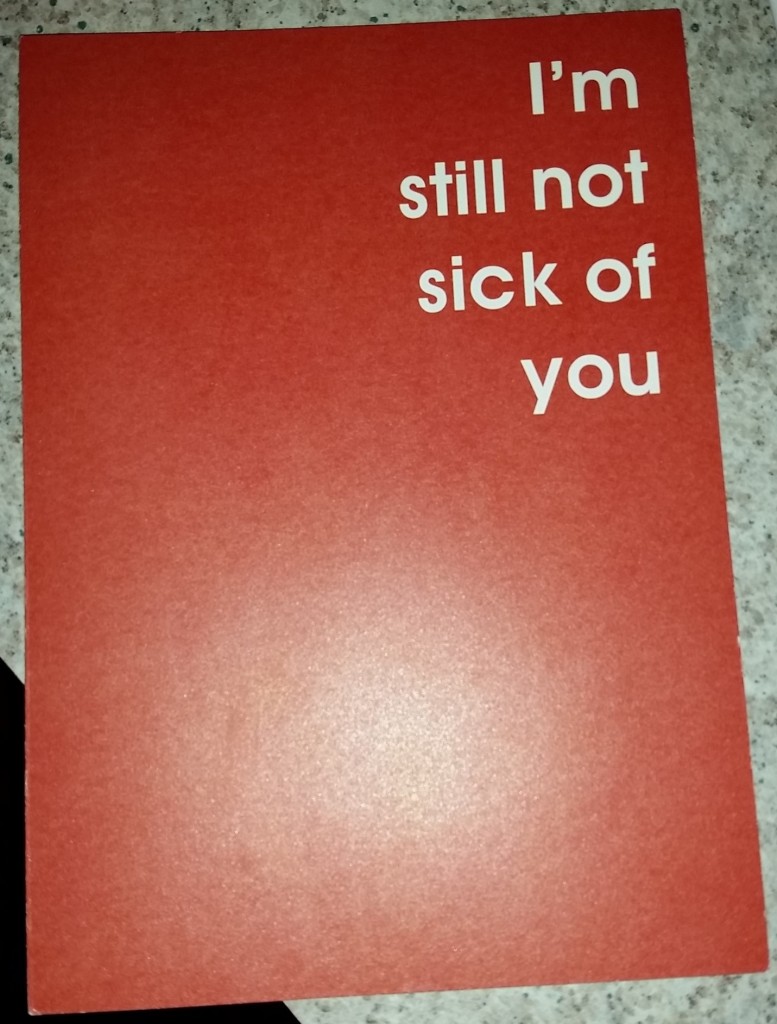
Robert Tracinski recently argued for a third way in the culture wars—one that embraces the value of sex and the human connection it offers. During his arguments, he made the following observation:
To be desired and to desire requires a confidence in your own value and the value of your partner. You are saying to them: you are a good person. Or more accurately: you are special, you’re different, you’re more interesting and fascinating that anyone else I know. And you want to know that they feel the same way about you. (If you feel the urge to contest this, try out ‘you’re just as good as anybody else, I suppose’ on Valentine’s Day, and let me know how that works out.)
This reminded me of my paternal grandparents and the hopelessly romantic story of their marriage. Gramps was home from World War II, ready to find a wife and settle down. So he went to Granny’s house. And asked for her sister. Alas, Aunt Millie was already engaged to Unc. Granny, being somewhat competitive with her sister, realized Gramps was unaffiliated and announced that they were engaged. Gramps mulled it over, apparently realized she was just as good, and decided to go along with this pronouncement.
That marriage only lasted 41 years, till Gramps died, and produced a scant five children.
I remember Granny at the funeral, weeping and recounting all the ways he’d been a great husband, father, and provider. It made sense. Besides carrying the name that would become my father’s name and then mine, he was a great grandfather. He went too far when it came to school fundraisers and didn’t back out when he realized he should’ve paid more attention to the terms. He learned how to help me work on my old Vision Mark Gonzalez even though he didn’t know the first thing about skateboarding.
First, a Word About the Dread ‘Holiday’
So I’m not so sure Robert is correct that telling someone they’re just as good as anyone else is really that damning. But since we’re now floating on Earth 2, a strange land in which a Christian is getting onto an Objectivist for being too romantic, let’s continue.
To be fair, approximately 99 percent of what Rob wrote is true and is definitely not the Stuart Smalley guide to picking a spouse. When it comes to sex, we’ve invented some weird new hang-ups as a society. When it comes to love, though, I’m hesitant about getting too mushy as a society. I’m not going to Jared, although this Jared who sells falcons does pique my interest. I’m not buying holiday-priced roses. I’m not battling angry mobs for a seat at whatever restaurant is dealing with hordes of idiots trying to impress their dates by being jerks.
Seriously, dude, send back the Beringer White Zin as being ruined by cork taint one more time and I’ll smash it over your head. Beringer White Zin is Beringer White Zin. Every time. Every bottle. I hope the next one opens a portal into another dimension and you get sucked through it into a barren wasteland of pain and torment.
Have I ever mentioned I used to wait tables?
Love Won’t Keep Us Together
I don’t totally eschew Valentine’s Day. I will sometimes offer a humorous gift, a highlight being the year I gave a Barry White CD and a copy of the Kama Sutra. But I digress. This isn’t about Valentine’s Day any more than Valentine’s Day is really about love. Love Day is about love. And as I’ve written, I’m not terribly sure marriage is about love either, at least not in the doe-eyed soulmate sense of the word.
Look, love is great. It’s generally a prerequisite for many of our most worthwhile but stupid decisions. But we also need to remember that, unless we are screenwriters, love will never, ever, ever lead to happily ever after. There is a reason movies tend to end with the wedding, which is the way society has come to define love—not as a curable temporary insanity, but as a destination. It is not. It is the first step of journey, and if we want love to be a long and positive journey, we must remember our Bierce. If we maintain marriage can subsist solely on our love for our soulmates, if we insist our insanity is incurable, this law firm has a billboard for us.
In the case of my grandparents, love wasn’t even a prerequisite for one of their most worthwhile decisions. I won’t go so far as to say they went all in on stupidity—it was a different time and obviously Gramps had some things going for him or Granny wouldn’t have made him her fake fiancé—but it’s not a story that would generally be described as romantic.
It’s Really More About Not Getting Sick of Someone
But it worked, for 41 years and five children, because they worked at it, not because, to again quote Rob, “Romantic love is the ultimate mutual admiration society: we’re so great that we can’t keep our hands off one another.” No, true love is more about tolerance, not admiration. It’s about gritting your teeth and persevering on the days when you really don’t like one another. Maybe you soldier through, offer a few touches, and let biology be your reminder. Maybe you call it a day so you can wake up not just in love with each other, but also liking one another.
I wasn’t a fly on the wall. I don’t have a time machine. My stories are more about the time Gramps smacked me on the back of the head for riding over a log a little too quickly while I was piloting the three-wheeler. But I have stories from my dad and two aunts and two uncles. Gramps and Granny did all right. Maybe if Etsy had existed in the early ’40s, Gramps could have responded to Granny’s subterfuge with a lukewarm balloon.
But I do know that they loved one another, even if it was a love founded not on a mutual admiration society, but a “Well, you’re good enough” society. Maybe it’s our Gen X cynicism, but my wife and I by no means say, “You’re good enough.” We don’t call each other soulmates, either. We’re aware we’re making a great thing work with effort and intentionality. And when I gave the following card for a Valentine’s Day card a few years ago, I got a warm kiss, a well-liked Facebook post, and an addition to her memory box.










